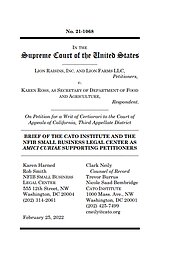Learn more about Cato’s Amicus Briefs Program.
The California Marketing Act (CMA) is a state-level counterpart to the federal Agricultural Marketing Agreement Act (AMAA), which was described by Justice Elena Kagan as “the world’s most outdated law.” Though part of a New Deal-era effort to mitigate “unfair competition,” marketing orders passed under these acts actually create government-sponsored cartels. Critically, they also undermine the fundamental principle of representative government.
Marketing orders passed under the CMA may restrict the quantity of a commodity that producers can sell, limit their grade, size, or quality, and may impose onerous taxes on all producers to fund advertising. Industry participants vote for or against these orders, but the scales are tilted toward large raisin producers.
In 1998, Sun-Maid and the Raisin Bargaining Association (RBA), the two largest California raisin cooperatives, proposed a marketing order to tax all industry participants in order to fund an advertising campaign which lauded dominant cooperatives’ products and implicitly disparaged the products of their smaller competitors, like Lion Raisins. Unsurprisingly, Lion Raisins voted against the order, but the CMA uses a bloc-voting system, where cooperative associations vote on behalf of all their members, but smaller, independent producers vote only for themselves. Lion Raisins was effectively denied a say in how it would be governed. By virtue of their market share, large cooperatives like Sun-Maid and the RBA pass each referendum they draft and block each referendum they oppose, becoming the de facto regulators of the entire industry. Bloc-voting thus leads to taxation without representation for independent producers.
Lion Raisins challenged this lopsided system of regulatory capture, but the California Court of Appeal held that the “one person, one vote” principle of representative government did not apply to the CMA. The court wrote that the bloc-voting statute was sufficiently related to “legitimate governmental purposes” to withstand constitutional scrutiny. But allowing large cooperatives to regulate their competitors—and abuse that power to entrench their own market share—disregards the most basic principle of our constitutional order: a legitimate government must derive its “Powers from the Consent of the Governed.”
Now on petition to the Supreme Court, Cato, joined by the National Federation of Independent Business Small Business Legal Center, has filed a brief in support, asking the Court to take up Lion Raisins’s case to realign the CMA with fundamental principles of representative government and to reinvigorate competition in a sheltered industry. During the New Deal, President Roosevelt sought to replace “unfair competition” with “cooperation.” But “cooperation” under the marketing orders is government-sponsored cartelization by another name. Today, the AMAA and CMA permit marketing orders that hold prices artificially high, harm consumers, and inhibit competition. Bloc-voting greatly exacerbates this effect by effectively granting dominant cooperatives the power to regulate in their own interests.
Rather than mitigating “unfair competition,” then, bloc voting under the CMA creates a state-run system whereby those who set the tax are unaccountable to those who pay it. Eliminating the bloc-voting scheme would help to retire many of these irrelevant, anticompetitive marketing orders. It would also restore the critical constitutional guarantee of representative government.

This work is licensed under a Creative Commons Attribution-NonCommercial-ShareAlike 4.0 International License.



